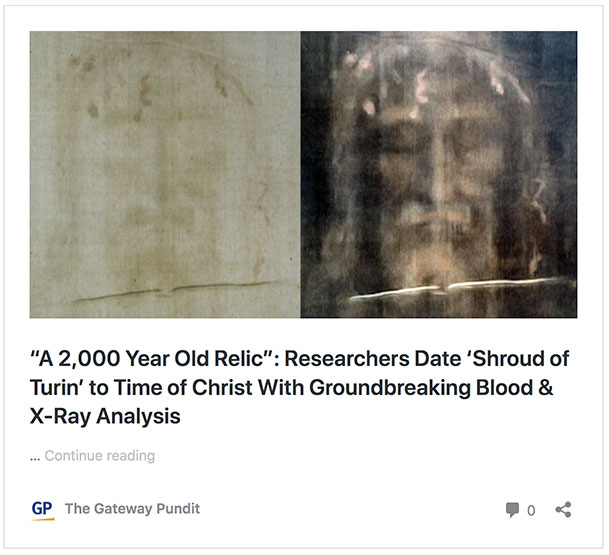Italian Scientist GUARANTEES: Shroud of Turin Is REAL

From the distant past, comes a 14 feet by 5 inches piece of linen cloth marked with a faint image of the front and back of a man that – Christian believe – depicts the tortured and crucified body of Our Lord Jesus Christ.
For centuries, millions have gone to the Italian city of Turin to personally experience its famous shroud.
Many times was it described as a ‘hoax’ by flawed and incomplete scientific studies – but the faithful have never wavered.
Now, after new state-of-the art scientific studies, a scientist is now convinced that the shroud really did cover Jesus’ body – and he says there’s an ‘enormous quantity of evidence’ to back his claim up.
Italian Professor Liberato De Caro, who is also a committed Catholic and a deacon in his local church, thrashed claims that the shroud was ‘produced in medieval times’.
Daily Mail reported:
“The authenticity of the shroud has been frequently brought into question over the years but there are also many studies claiming to validate its origin. It is considered to be one of the most intensely studied human artifacts in history.”
The Shroud first appeared in the west in 1354. The Vatican authorities have gone back and forth on their acceptance of the relic.
“Professor De Caro told the Telegraph: ‘If I had to be a judge in a trial, weighing up all the evidence that says the Shroud is authentic and the little evidence that says it is not, in all good conscience I could not declare that the Turin Shroud is mediaeval. It would not be right, given the enormous quantity of evidence in favour of it’.”
The Shroud of Turin Research Project (STURP) in the decade of 1980s had already detected that the linen fabric was indeed stained with blood with traces of hemoglobin and serum albumin.
“In 1981, in its final report, STURP wrote: ‘We can conclude for now that the Shroud image is that of a real human form of a scourged, crucified man. It is not the product of an artist’.”
Professor De Caro explains that before his new study, ‘the only missing piece of the puzzle was dating’, since everything on the Shroud of Turin is ‘highly correlated to what the Gospels tell about Jesus Christ’ and his death: ‘crown of thorn’ marks on the head, whip lacerations on the back and bruises on the shoulders from carrying a heavy cross.
It’s true that a much-publicized – but deeply flawed study in the 1980s attempted to debunk the relic, dating it to the Middle Ages.
But the Italian academics now used a new technique involving x-rays to date the material, and confirmed it was manufactured about 2,000 years ago.
“Professor De Caro and his team at the Institute of Crystallography of the National Research Council in Bari, Italy used a technique called wide-angle X-ray scattering (WAXS) on a tiny sample from the shroud, smaller than a grain of rice. […] Based on the amount of [cellulose] breakdown, the team determined that the shroud was kept at temperatures at about 72.5°F and a relative humidity of around 55 per cent for about 13 centuries before it arrived in Europe.”
The structural degradations was compared – and found to be ‘fully compatible’ – with those of the another linen sample that was dated, according to historical records, to AD 55-74.
Not only that, but also the shroud was compared with samples from linens manufactured between 1260 and 1390 AD, finding none were a match.
“The new findings lend credence to the idea that the faint, bloodstained pattern of a man with his arms folded in front were left behind by Jesus’ dead body. They also contradict findings in the 1980s that the shroud dates back nowhere near as far as the time of Jesus.
[…] ‘While authenticity cannot be established, it should be fairly easy to determine if it is a medieval forgery’, said Tim Andersen, research scientist at the Georgia Institute of Technology who was not involved with the new study. ‘Yet, despite decades of scientific testing and peer-reviewed articles on it, that conclusion has never been demonstrated. Rather, the evidence has continually pointed away from any known forging techniques’.”






















